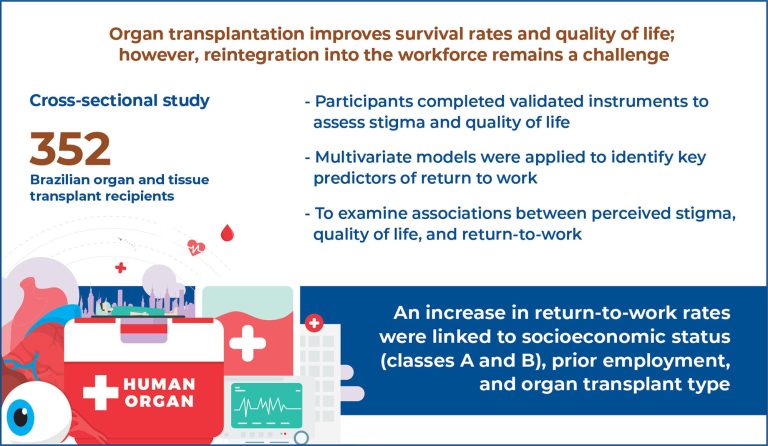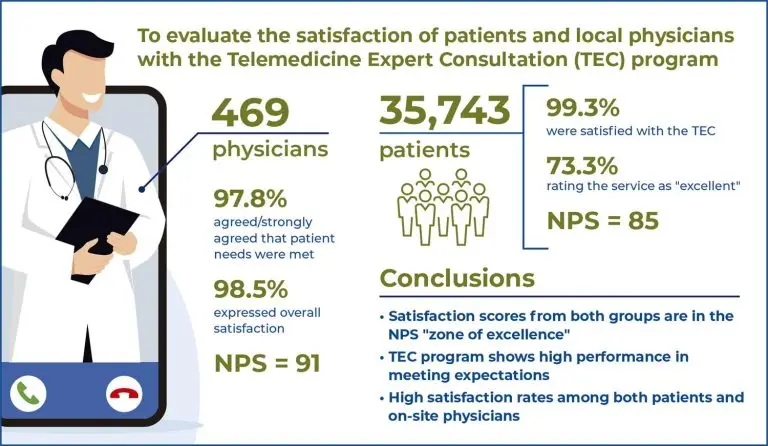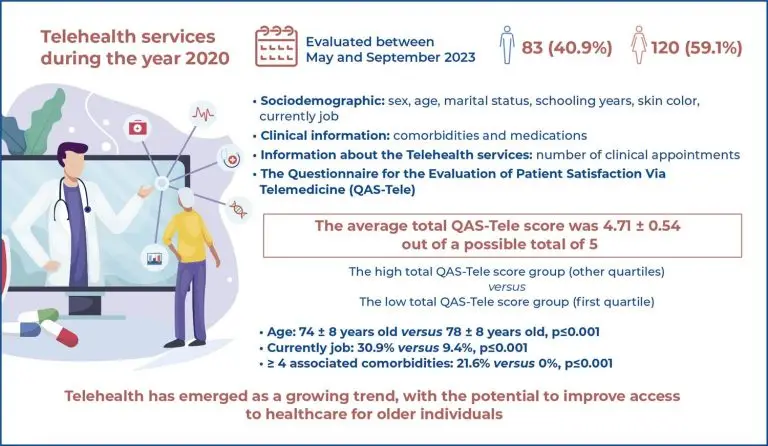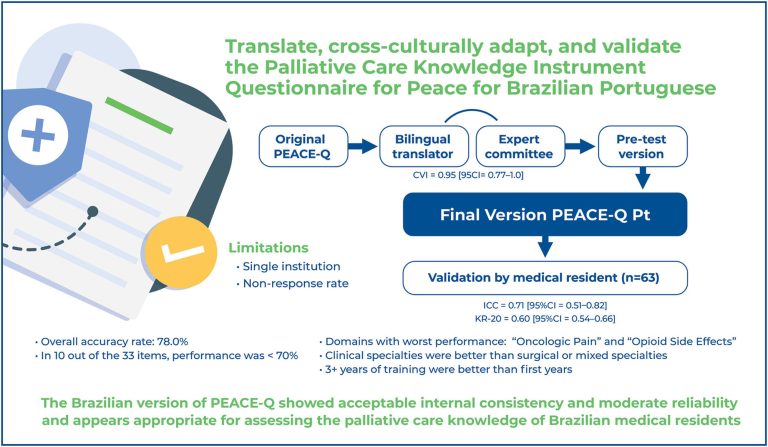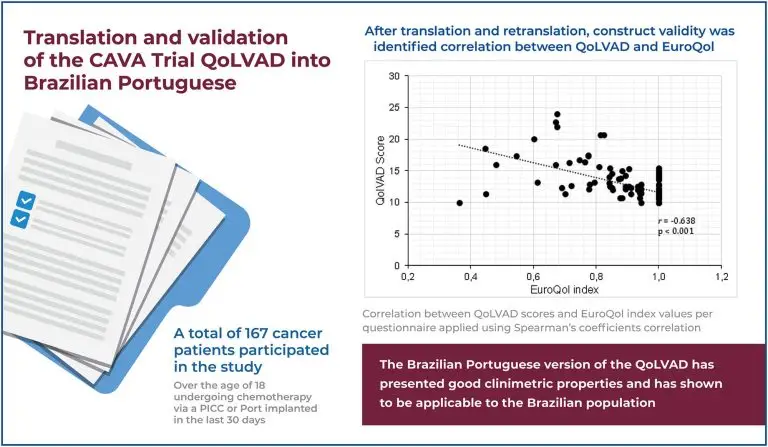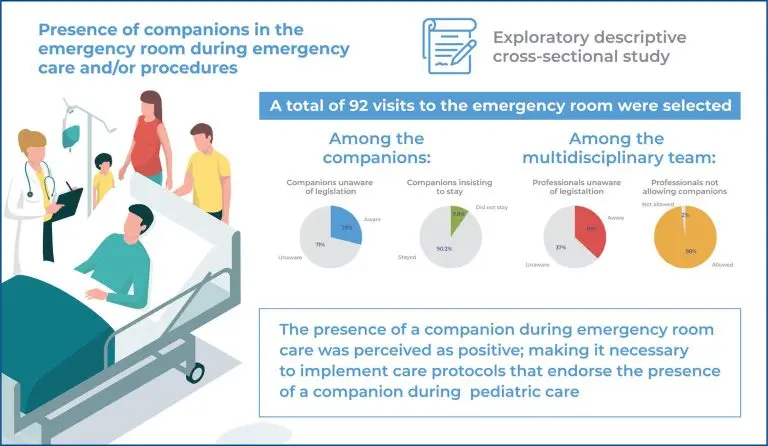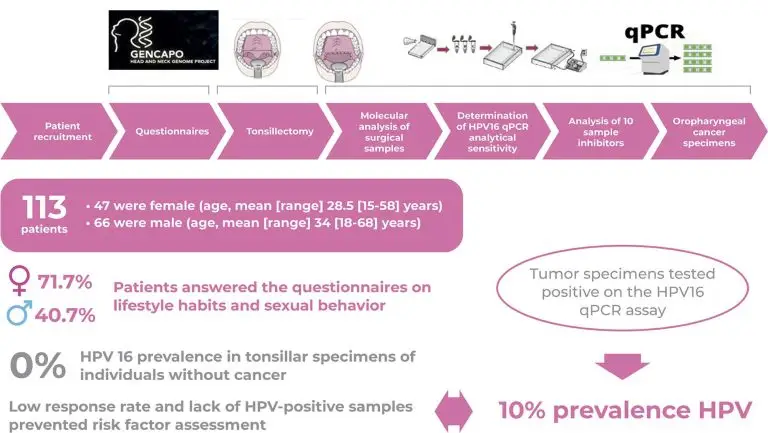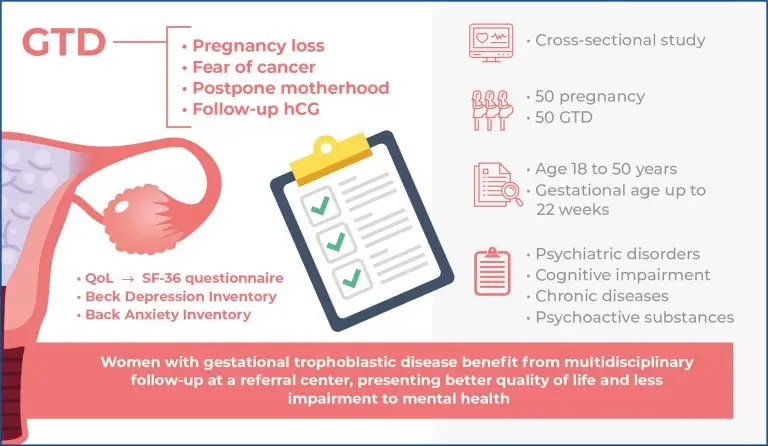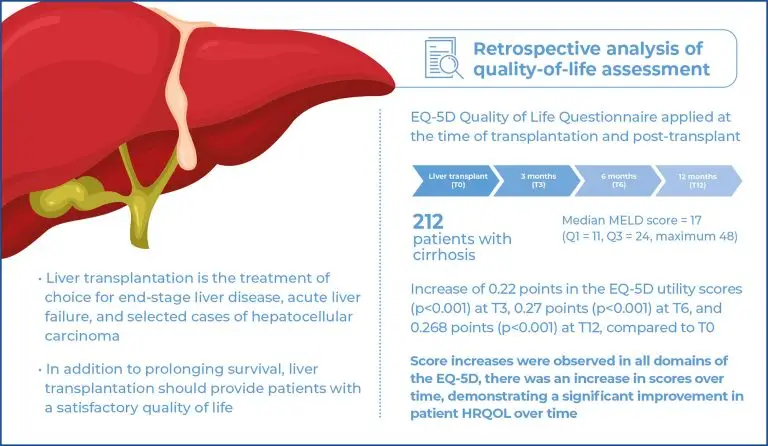31/out/2025
Stigma, quality of life, and return-to-work outcomes among organ and tissue transplant recipients in Brazil: a cross-sectional study
DOI: 10.31744/einstein_journal/2025AO1737
Highlights ■ The return to work rate was 53.7%, with slower and lower reintegration among low-income recipients. ■ Individuals with higher socioeconomic status (Classes A and B) were over twice as likely to return to work compared with lower socioeconomic status. ■ Higher stigma scores were significantly associated with reduced quality of life in Functional Capacity, Mental Health, and Social Functioning domains (p<0.001). ■ Older age (≥51 years), racial disparities, and unemployment before transplantation were strong barriers to occupational reintegration. […]
Palavras-chave: Transplante de órgãos; Qualidade de vida; Return to work; Estigma Social; Inquéritos e questionários
22/set/2025
Patient and on-site physician satisfaction with a comprehensive specialist teleconsultation program
einstein (São Paulo). 22/set/2025;23:eAO1762.
Ver Artigo22/set/2025
Patient and on-site physician satisfaction with a comprehensive specialist teleconsultation program
DOI: 10.31744/einstein_journal/2025AO1762
Highlights ■ Net Promoter Scores of 85 and 91 among patients and physicians, respectively, over three years. ■ A total of 99.3% of patients were satisfied with the teleconsultation. ■ A total of 98.5% of physicians reported overall satisfaction with the program. ■ Surveys reflect excellence in telemedicine expert consultation. ABSTRACT Objective: Telemedicine via teleconsultations enhances access to specialized care. However, the degree of satisfaction among patients and providers with this method remains unclear. This study assessed patient and on-site […]
Palavras-chave: Satisfação do paciente; Remote consultation; Inquéritos e questionários; Telemedicina
22/set/2025
Satisfaction with a telehealth service among older adults
DOI: 10.31744/einstein_journal/2025AO1578
Highlights ■ The average total QAS-Tele score was 4.71±0.54 out of 5. ■ Higher satisfaction was reported by older adults in the younger age range. ■ Higher satisfaction was reported by individuals currently working. ■ Higher satisfaction was reported by individuals with a higher number of comorbidities. ABSTRACT Objective: This retrospective observational study analyzed satisfaction with a telehealth service in older individuals living in a metropolitan city in Brazil. Methods: Sociodemographic, clinical, and telehealth service details (number of clinical appointments […]
Palavras-chave: Idoso; Satisfação do paciente; Inquéritos e questionários; Telehealth patient monitoring; Telemedicina
22/set/2025
Attitudes, knowledge, opinions, and expectations of medical students towards medical artificial intelligence solutions: a cross-sectional survey study
DOI: 10.31744/einstein_journal/2025AO1401
Highlights ■Most students have a positive attitude towards medical artificial intelligence. ■ Artificial intelligence solutions would be frequently adopted if accurate, fast, and user-friendly. ■ Expectations include work facilitation and increased diagnosis and management speed. ■Most fear losing medical skills to artificial intelligence and desire governmental regulations. ABSTRACT Objective: To assess medical students’ attitudes, knowledge, opinions, and expectations regarding medical artificial intelligence solutions, according to their sex and year of study. Methods: This cross-sectional survey was a single-center study conducted […]
Palavras-chave: Adoption; Inteligência artificial; Knowledge, attitudes, practice; Percepção; Estudantes de Medicina; Inquéritos e questionários
30/jul/2025
Translation, cross-cultural adaptation, and validation of the Palliative Care Knowledge Questionnaire for PEACE (PEACE-Q) in Brazilian Portuguese
einstein (São Paulo). 30/jul/2025;23:eAO1243.
Ver Artigo30/jul/2025
Translation, cross-cultural adaptation, and validation of the Palliative Care Knowledge Questionnaire for PEACE (PEACE-Q) in Brazilian Portuguese
DOI: 10.31744/einstein_journal/2025AO1243
Highlights ■ Performance was <70% in 10 of the 33 items. ■ Lowest performance domains were Oncologic Pain and Opioid Side Effects. ■ Residents in clinical specialties outperformed those in surgical or mixed specialties. ■ Residents with ≥3 years of training outperformed those on their first 2 years. ABSTRACT Objective: To translate, cross-culturally adapt, and validate the Palliative Care Knowledge Questionnaire for PEACE (PEACE-Q) in Brazilian Portuguese. Methods: This study followed five steps: translation, back-translation, cultural adaptation, pre-test, and test-retest. […]
Palavras-chave: Clinical competence; Educação médica; Internato e residência; Cuidados paliativos; Psicometria; Inquéritos e questionários; Validation study as topic
23/jul/2025
Translation and validation of the Brazilian Portuguese version of the quality of life vascular access device questionnaire for chemotherapy patients
einstein (São Paulo). 23/jul/2025;23:eAO1665.
Ver Artigo23/jul/2025
Translation and validation of the Brazilian Portuguese version of the quality of life vascular access device questionnaire for chemotherapy patients
DOI: 10.31744/einstein_journal/2025AO1665
Highlights ■ Assessing how vascular access devices affect quality of life is essential to effectively manage chemotherapy patients. ■ The translation and validation of the QoLVAD questionnaire demonstrated that the Brazilian Portuguese version can be applied to the Brazilian population. ABSTRACT Background: The use of long-term devices for chemotherapy in neoplastic diseases is very common. The CAVA trial was an extensive study that prospectively evaluated more than 1000 patients undergoing chemotherapy and randomly allocated them to three groups based on […]
Palavras-chave: Qualidade de vida; Inquéritos e questionários; Traduções; Estudos de validação como assunto; Dispositivos de acesso vascular
10/jun/2025
Perception of the multidisciplinary team and the patient’s family companion regarding their presence during emergency room care
einstein (São Paulo). 10/jun/2025;23:eAO0871.
Ver Artigo10/jun/2025
Perception of the multidisciplinary team and the patient’s family companion regarding their presence during emergency room care
DOI: 10.31744/einstein_journal/2025AO0871
Highlights ■ Family presence improves communication and patient comfort during pediatric emergency room care. ■ Overall, 90.2% of companions stayed during care, despite 71% being unaware of the legislation. ■ Of the professionals, 96% allowed companions, with 87% citing comfort for patients. ■ This study supports creating clear protocols for family inclusion during emergencies. ABSTRACT Objective: To evaluate the perceptions of family companions and the professional team regarding the presence of a family member during emergency and urgent care at […]
Palavras-chave: Adolescente; Ressuscitação cardiopulmonar; Child; Serviço hospitalar de emergência; Hospitais pediátricos; Intubação intratraqueal/instrumentação; Intubação intratraqueal; Equipe de assistência ao paciente; Inquéritos e questionários
03/jun/2025
Prevalence of tonsillar human papillomavirus infection in low-risk individuals without cancer
DOI: 10.31744/einstein_journal/2025AO1715
Highlights ■ Prevalence of HPV16 is extremely low in the tonsil of healthy Brazilian population. ■ The prevalence of HPV16 in oropharyngeal squamous cell carcinoma was 10% in Brazilian samples. ■ The rate of HPV16 tonsillar infection should be lower than that reported previously in Brazil. ABSTRACT Objective: This study aimed to determine the prevalence of human papillomavirus (HPV) 16 infection in the tonsils of patients without cancer and to analyze the associated risk factors in a low-risk population in […]
Palavras-chave: Human papillomavirus viruses; Oropharynx; Palatine tonsil; Características da população; Prevalência; Inquéritos e questionários
22/abr/2025
Psychological impact of gestational trophoblastic disease: a cross-sectional study
einstein (São Paulo). 22/abr/2025;23:eAO1014.
Ver Artigo22/abr/2025
Psychological impact of gestational trophoblastic disease: a cross-sectional study
DOI: 10.31744/einstein_journal/2025AO1014
Highlights ■ Gestational trophoblastic disease should be followed up at a referral center. ■ Adequate follow-up improves quality of life for affected women. ■ Multidisciplinary monitoring reduces anxiety and depression in women. ABSTRACT Objective: To evaluate the psychological repercussions of gestational trophoblastic disease. Methods: A cross-sectional study including 100 women (50 with gestational trophoblastic disease and 50 without) was conducted between September 2020 and October 2021. Socio-demographic characteristics, quality of life, depression, and anxiety were evaluated and follow-up was performed […]
Palavras-chave: Ansiedade; Depressão; Gestational trophoblastic disease; Saúde Mental; Qualidade de vida; Inquéritos e questionários
28/mar/2025
Impact of liver transplantation on the quality of life of a cohort of high-risk recipients
DOI: 10.31744/einstein_journal/2025AO0565
Highlights ■ Liver transplantation improves health-related quality of life in patients with cirrhosis and high MELD scores. ■ Significant health-related quality of life improvements occur within three months of transplantation. ■ Multidisciplinary care programs enhance post-iver transplantation physical and mental recovery. ■ Sustained health-related quality of life gains highlight the long-term benefits of liver transplantation. ABSTRACT Objective: To assess the effects of liver transplantation on the health-related quality of life of patients with cirrhosis on the waiting list for transplantation. […]
Palavras-chave: Alcoolismo; Nível de saúde; Cirrose hepática; Transplante de fígado; Morbidity; Qualidade de vida; Inquéritos e questionários; Waiting list


